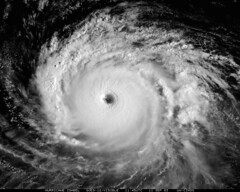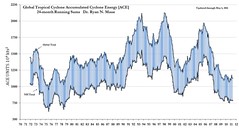As of April 2011 Colorado State University, Weather Service International, and Tropical Storm Risk have lowered the number of hurricanes they're expecting in the Atlantic Basin for the 2011 season. Nevertheless, they all agree the season should be well above average. CSU expects 16 named storms and 9 hurricanes while Weather Service International foresees a more impactful season along the U.S. coastline. They estimate 15 named storms and 8 hurricanes. Tropical Storm Risk calls for 14 named storms and 7 to 8 hurricanes. They realize that it is, of course, impossible to precisely predict this or any season's hurricane activity in early April.

Because a land-falling hurricane can cause extensive damage, risk management experts work with models that are designed to estimate insured losses due to these tricky tropical tempests. What has presented even more of a problem for these experts is trying to anticipate where and how many hurricanes will make landfall. The three major catastrophe modelers, AIR Worldwide, EQECAT, and Risk Management Solutions (RMS) have recently concluded that their near term hurricane models have significantly overestimated losses due to land-falling hurricanes. For example, they initially projected insured loss levels for the 2006-2010 period at 35 percent above the long-term average. The actual cumulative losses, however, were less than one third of the long-term cumulative average.

Here's where the Hurricane Frequency Paradox comes into play which states that although there has been an increase in Atlantic tropical activity since the 19th century, there has not been an increase in hurricane landfalls for the United States. The answer may be due to improved observational techniques according to NOAA researchers. For example, in the days before satellite technology, some tropical systems that formed and died out at sea went undetected. Now they are tallied up with each season's hurricanes if and when they occur.
As pointed out above, the near term hurricane models can't produce credible estimates of losses at specific locations, which is what insurance companies and the average citizen are most interested in, because conventional meteorology is unable to generate long-range forecasts of hurricane strikes for specific locations. The study of astro-meteorology offers some assistance to this very problem. As put forth by Johannes Kepler, the discoverer of the planetary laws of motion, astro-meteorology is a long-range weather forecast system based on planetary cycles. The system allows the formulation of long-range weather forecasts months or years in advance that can pinpoint, not just general trends, but specific forecasts that cover the time, place, and type of weather to be expected. Although no forecast method can claim 100 percent accuracy, and astro-meteorology is no exception, it can give a much clearer picture. Tropical systems Alex, Bonnie, Earl, Matthew, and Tropical Depression 10E were all forecast months in advance last year using this method. Although no hurricane made a direct U.S. landfall last year all of these systems affected land areas in the western hemisphere. Where ever there's a problem, God has a solution--astro-meteorology may very well be, in more ways than one, heaven helping us.
May 8-17, 2011 Forecast
Hurricane Season 2011 Predictions
April 18-24, 2011 Severe Weather Window
Overview of UK Winter 2012-13
The Winters of 2011-14
Cyclone Yasi fulfills long-range prediction!
Tropical Storm Matthew Fulfills Long-range Forecast!
Hurricane Earl and T.D. 10E Fulfill Long-range Forecasts!
Tropical Storm Alex Fulfills Long-range Prediction!
Bonnie Fulfills Long-range Forecast!
Introduction to the Weather Alternative
How Long-Range Forecasts Are Made
Excerpts from Tidal Dynamics by Fergus J. Wood

Because a land-falling hurricane can cause extensive damage, risk management experts work with models that are designed to estimate insured losses due to these tricky tropical tempests. What has presented even more of a problem for these experts is trying to anticipate where and how many hurricanes will make landfall. The three major catastrophe modelers, AIR Worldwide, EQECAT, and Risk Management Solutions (RMS) have recently concluded that their near term hurricane models have significantly overestimated losses due to land-falling hurricanes. For example, they initially projected insured loss levels for the 2006-2010 period at 35 percent above the long-term average. The actual cumulative losses, however, were less than one third of the long-term cumulative average.

Here's where the Hurricane Frequency Paradox comes into play which states that although there has been an increase in Atlantic tropical activity since the 19th century, there has not been an increase in hurricane landfalls for the United States. The answer may be due to improved observational techniques according to NOAA researchers. For example, in the days before satellite technology, some tropical systems that formed and died out at sea went undetected. Now they are tallied up with each season's hurricanes if and when they occur.
As pointed out above, the near term hurricane models can't produce credible estimates of losses at specific locations, which is what insurance companies and the average citizen are most interested in, because conventional meteorology is unable to generate long-range forecasts of hurricane strikes for specific locations. The study of astro-meteorology offers some assistance to this very problem. As put forth by Johannes Kepler, the discoverer of the planetary laws of motion, astro-meteorology is a long-range weather forecast system based on planetary cycles. The system allows the formulation of long-range weather forecasts months or years in advance that can pinpoint, not just general trends, but specific forecasts that cover the time, place, and type of weather to be expected. Although no forecast method can claim 100 percent accuracy, and astro-meteorology is no exception, it can give a much clearer picture. Tropical systems Alex, Bonnie, Earl, Matthew, and Tropical Depression 10E were all forecast months in advance last year using this method. Although no hurricane made a direct U.S. landfall last year all of these systems affected land areas in the western hemisphere. Where ever there's a problem, God has a solution--astro-meteorology may very well be, in more ways than one, heaven helping us.
May 8-17, 2011 Forecast
Hurricane Season 2011 Predictions
April 18-24, 2011 Severe Weather Window
Overview of UK Winter 2012-13
The Winters of 2011-14
Cyclone Yasi fulfills long-range prediction!
Tropical Storm Matthew Fulfills Long-range Forecast!
Hurricane Earl and T.D. 10E Fulfill Long-range Forecasts!
Tropical Storm Alex Fulfills Long-range Prediction!
Bonnie Fulfills Long-range Forecast!
Introduction to the Weather Alternative
How Long-Range Forecasts Are Made
Excerpts from Tidal Dynamics by Fergus J. Wood
Encouragement
No comments:
Post a Comment